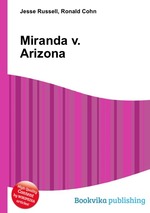Miranda v. Arizona
Jesse Russell Ronald Cohn
бумажная книга
High Quality Content by WIKIPEDIA articles! Miranda v. Arizona, 384 U.S. 436 (1966), was a landmark decision of the United States Supreme Court which passed 5-4. The Court held that both inculpatory and exculpatory statements made in response to interrogation by a defendant in police custody will be admissible at trial only if the prosecution can show that the defendant was informed of the right to consult with an attorney before and during questioning and of the right against self-incrimination prior to questioning by police, and that the defendant not only understood these rights, but voluntarily waived them. This had a significant impact on law enforcement in the United States, by making what became known as the Miranda rights part of routine police procedure to ensure that suspects were informed of their rights. The Supreme Court decided Miranda with three other consolidated cases: Westover v. United States, Vignera v. New York, and California v. Stewart.


